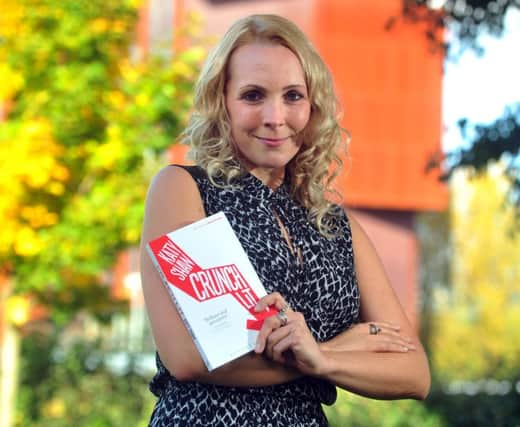Dr Katy Shaw: Why we must become the masters of our financial system


Dr Katy Shaw’s family received a harsh lesson in the power of market forces before she started school.
Her father Mike worked as a shipbuilder in Newcastle in the 1980s, and, in common with many people in the North East, his fate was shaped by the hard times which followed the miners’ strike.
Advertisement
Hide AdAdvertisement
Hide Ad“Dad was made redundant three times before I was three,” said Ms Shaw. “He realised that industry as he knew it was not going to survive, so he needed to change. So he retrained as a teacher. I saw through him the transformative power of education and the opportunities it gave us as a family.”
In her latest role, as principal lecturer in Contemporary Literature at Leeds Beckett University, she wants to use the power of education to help regenerate communities that resemble the one she grew up in. She’s involved, for example, in a new project that will see academics from the university go out and work with community groups around Leeds to celebrate the area’s cultural heritage.
In her new book – Crunch Lit – she argues that we should make capital our servant, in a financial system that is tightly regulated and jargon-free.
She has become a trumpeter for causes that place her at odds with the Tory Government; including the anti-austerity policies of Jeremy Corbyn. She chaired an event with Mr Corbyn in Leeds over the summer, and she describes the Government’s Northern Powerhouse as a “bad narrative” because she believes it was not formulated after meaningful consultation with Northern people.
Advertisement
Hide AdAdvertisement
Hide AdShe also supports the Orgreave Truth and Justice Campaign, which is calling for a probe into allegations of police misconduct during the miners’ strike.
Cambridge graduate Ms Shaw has already written a book about the cultural representations of the miners during the strike, and her latest work casts a critical eye over the novels that chronicle the impact of the 2008 financial crash.
“It developed from my work on the miners’ strike and thinking about booms and bust, and how the country approaches periods of austerity,’’ she said.
Ms Shaw can remember the days “when we got credit card offers through the post with ridiculously low offers”.
Advertisement
Hide AdAdvertisement
Hide AdShe said: “My friends graduated from uni and got 110 per cent mortgages at Northern Rock. I witnessed the fall of Northern Rock in Newcastle. The opening line of my book is from one of the Northern Rock reports.”
With hindsight, Northern Rock’s trading statements from early 2007 read like missives sent from the bridge of an ocean liner that is powering towards the nearest iceberg. The people at the helm are blithely unaware of the colossal risks.
“We have lots of things to learn from the financial crisis,” said Ms Shaw. “I worry that we aren’t learning them fast enough. The language of finance is impenetrable because there are so many acronyms. Do you know your SIV from your CDO? And if you don’t, you probably don’t know how your savings work or credit card works, or your mortgage works, or actually who you owe your mortgage to. Most people’s concept of how banks work and money works is based on a long gone fairy tale. We’re talking about a period in which money has become virtual and almost invisible.”
The big banks have been cast as the villains; private sector institutions that did very nicely, thank you during the boom times. You don’t see many fallen figures from the financial services industry queuing outside food banks.
Advertisement
Hide AdAdvertisement
Hide Ad“The Government, post-crash, chose to go down the austerity agenda,’’ said Ms Shaw. “This effectively transferred a private debt into a public sector debt, despite the fact that it continued to propose that the private sector was a better model for the public sector, even though the private sector had just failed massively. Many nations in the wake of the financial crisis took the opposite approach. They invest; they spend to generate.”
She’s no fan of those who believe we should appease the financial services sector. If a big bank “throws their toys out of the pram and says they are going to leave the UK” then we should carry their bags, she said.
“We should have had more confidence in ourselves, economically, as a nation,’’ she said. “We’re a nation that has always produced things. It was no coincidence that the so-called FIRE industries – finance, insurance, real estate – were the ones that came in, but were then responsible for the crunch because they were the least regulated. They were allowed to grow at disproportionate levels.”
As Rowan Williams, the former Archbishop of Canterbury observed, the credit crunch taught us that economics is too important to be left to the economists.
Advertisement
Hide AdAdvertisement
Hide AdHowever, for a novelist, the crash can simply form the basis for a cracking yarn, such as John Lanchester’s Capital, which charts the credit crunch’s impact on the inhabitants of a single London street, or a A Week in December by Sebastian Faulks, which describes the amoral life of the mega-rich John Veals.
“It’s got this innate sense of drama and the unknown,’’ said Ms Shaw. “The classic narrative structure is an exposition, a complication and a resolution. All crashes have that. They are cyclical and they expose human nature.
“And they are largely seen through the eyes of men. That’s something that hasn’t changed much over time.”
So what we need is an authentic Northern female voice that speaks up for communities buffeted by market forces. Perhaps we have stumbled across Ms Shaw’s next project.